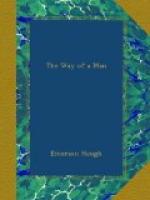My little personal affairs were at that time so close to me that they obscured clear vision of larger ones. I did not hear all the talk in the carriage, but pulled my horse in behind and so rode on moodily, gazing out across the pleasant lands to the foot of old Catoctin and the dim Blue Ridge. A sudden discontent assailed me. Must I live here always—must I settle down and be simply a farmer forever? I wanted to ride over there, over the Rock Fish Gap, where once King Charles’ men broke a bottle in honor of the king, and took possession of all the lands west of the Pacific. The West—the word in some way thrilled in my blood—I knew not why. I was a boy. I had not learned to question any emotion, and introspection troubled me no more than it did my pointer dog.
Before we had separated at the door of our house, I motioned to my mother, and we drew apart and seated ourselves beneath our own oaks in the front yard of Cowles’ Farms. Then I told her what had happened between Miss Grace and myself, and asked her if she was pleased.
“I am very content with thee,” she answered, slowly, musingly. “Thee must think of settling, Jack, and Miss Grace is a worthy girl. I hope it will bring peace between our families always.” I saw a film cross her clear, dark eye. “Peace!” she whispered to herself. “I wish that it might be.”
But peace was not in my heart. Leaving her presently, I once more swung leg over saddle and rode off across our fields, as sad a lover as ever closed the first day of his engagement to be wed.
CHAPTER VII
WHAT COMETH IN THE NIGHT
When I rode up our lane in the dusk, I found my father and mother sitting in the cool of the front gallery, and giving my rein to one of our boys, I flung myself down on the steps near by, and now and again joined in their conversation.
I was much surprised to learn that our whilom guest, Gordon Orme, had taken sudden departure during my absence, he having been summoned by a messenger from the village, who he stated brought him word that he must forthwith be on his way to Albemarle. He had asked my father if he cared to sell the black horse, Satan, to which he had taken a fancy, but this had been declined. Then it seems there had come up something of our late meeting at the village, and Orme, laughing, had told of our horse breaking and wrestling in a way which it seemed had not detracted from my standing in my parents’ eyes. None of us three was willing to criticise our guest, yet I doubt if any one of us failed to entertain a certain wonder, not to say suspicion, regarding him. At least he was gone.




